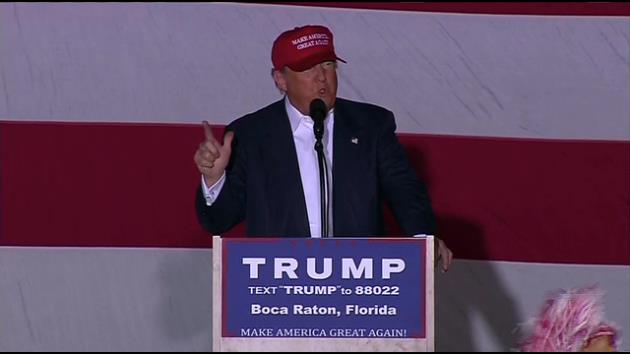LOS ANGELES (AP) — When radio host Hugh Hewitt asked Donald Trump this week if he really meant that President Barack Obama had founded the Islamic State group, it was the equivalent of offering him a do-over.
Trump declined, refusing to back down. While the GOP presidential candidate said Friday he was being sarcastic, the exchange stands as an example of a school of interviewing that some say turns political coverage on its head and others argue that, done right, can be valuable.
“It’s journalistic malpractice to lead your witness to give the desired response,” said Mark Feldstein, a journalism professor at the University of Maryland. “The standard in journalism is straight, objective questions, and that’s what I teach my students.”
While Hewitt and his fellow conservative pundits on TV are “partisans, not journalists,” he said, “does that allow them to lead presidential candidates?”
On his show Thursday, Hewitt gave Trump a chance to clarify his remarks about Obama and ISIS, an acronym for the terrorist group.
“I know what you meant. You meant that he (Obama) created the vacuum, he lost the peace,” Hewitt said.
“No, I meant he’s the founder of ISIS. I do,” Trump replied.
“But he’s not sympathetic to them. He hates them. He’s trying to kill them,” Hewitt said, but found himself unable to budge Trump, at the time, from his position.
A call to Hewitt seeking comment was not returned Friday.
Frank Sesno, a former CNN Washington bureau chief who is now a professor at George Washington University, sees the exchange differently in light of Trump’s unusual candidacy.
“So many of his answers appear to be stream-of-consciousness responses, so slamming on the brakes as an interviewer and saying, `Well, you don’t really mean that literally”‘ gives him a chance to either retract or “double down” as he did with the Islamic State claim, Sesno said.
“Did Hewitt give Trump an opportunity to walk it (his allegation) back, did he put words in his mouth? Yeah, he did. But Trump didn’t walk it back, which is why I think it’s so remarkably newsworthy,” he said. Because of Hewitt’s conservatism, his comments would not be seen as an attempt to bait Trump, Sesno said.
Hewitt last month endorsed Trump after initially criticizing his candidacy.
But the liberal watchdog group Media Matters contends the interview is part of a troubling pattern in which conservative hosts are serving as self-appointed “coaches” for Trump and his campaign.
“This is different from them espousing perspectives and opinions,” said Angelo Carusone, the group’s executive vice president. “In a way, this veers into much more direct advocacy, not about policies but about individuals.”
After Trump made a speech in which he suggested Second Amendment supporters could block Hillary Clinton from appointing a justice favoring gun control, he and Fox News Channel’s Sean Hannity — also a Trump supporter — addressed criticism that he was suggesting violence against the Democratic candidate.
“So, obviously you are saying that there’s a strong political movement within the Second Amendment and if people mobilize and vote they can stop Hillary from having this impact on the court,” Hannity said. “But that’s not how the media is spinning it.”
“Nobody in that room thought anything other than what you just said,” Trump replied.
Such exchanges make hosts “participants in messaging,” Carusone said. “I think in any other context, these people would be paid consultants.”
Sesno said Hannity’s approach falls into the unacceptable “friendly question” category that “tries to plant ideas in Trump’s head and words in his mouth. The viewer or reader must see it for what it is.”
Fox News Channel declined to make Hannity, who doesn’t hide his unabashedly conservative views, available for an interview.
Media Matters hasn’t seen the same kind of questioning with Clinton, Carusone said. The conservative watchdog Media Research Center said its president, L. Brent Bozell, was not immediately available to comment on the topic.
The world of interviewers has expanded beyond traditional journalists like NBC’s Chuck Todd and Fox’s Chris Wallace to include partisan pundits and even actor-comedian Zach Galifianakis with his “Between Two Ferns,” said Sesno.
“At the end of the day it’s the answer, and the audience gets the context, or we hope that the audience gets the context,” he said.
Copyright 2024 The Associated Press. All rights reserved. This material may not be published, broadcast, rewritten or redistributed.

